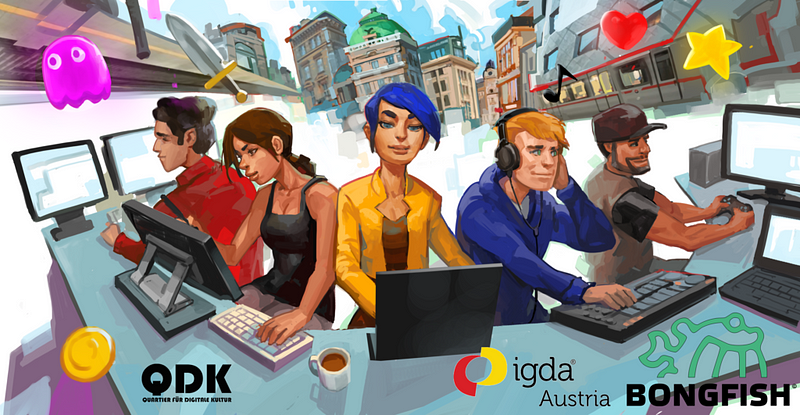Game Jam Advice for Beginners
Over the years I have participated in several game jams. I don’t regret getting involved in any of them, but there were definitely some disappointments along the way that I think could have been avoided if I had done a bit more research.

Over the years I have participated in several game jams, some solo and some with peers. I don’t regret getting involved in any of them, but there were definitely some disappointments and frustrations along the way that I think could have been avoided if I had done a bit more of my own research first. I hope this post will offer some useful tips for game jam success to help readers to avoid some of the pitfalls that I encountered while participating.

Be extremely cautious of teaming up with strangers on the internet. This may be the most controversial suggestion for some and the most obvious for others. The thing is, I do not have any friends that wanted to work on a game, so I decided to team up with some people I met through a discord group. It all seemed fine at first, and many of the team members delivered. We had a story, music, and graphics for the game. Unfortunately, our game developer disappeared a few days before the game jam was over and never came back, leaving the game unfinished.
Keep your scope small, ESPECIALLY if developing solo. When I was developing my first game jam game, Education Sim, I became excited about all of the cool mechanics and logic I could add to make the game more interesting. What I didn’t think about was how each feature I was adding would affect the actual game play. I ended up play testing the game an insane number of times, and still wasn’t sure if it was winnable at the end.
Make sure your UI is not an afterthought. It’s easy to get so caught up in the mechanics and other features of your game that you can forget about how important it is for players to actually understand HOW to play. This is probably my biggest regret with Education Sim. I assumed that players would look at the instructions before they started playing, which is usually NOT the case. The engine I was using added limitations to how intuitive I could make the UI, and if I had given myself more time to think about those challenges I would have had a better game.
Agree on regular check in’s with your team. There is nothing worse than getting ghosted by a teammate when the game jam is about to end. You can avoid this happening by agreeing on regular check ins where teammates share their progress. That way, if a teammate does not show up or have any progress to share, you can find someone else. This ensures the game still gets completed on time.
Make a game design document early on. Probably the best way to do this is in google docs, so you can share the document with the team and give them editing rights. You want your team to be on the same page about what you are making and what the major features will be. Until it is written on paper you don’t know what ideas are really in everyone’s head. It’s important to know whether you are all really on the same page. This also goes for solo developers, because it will work as a reference for you and keep you clear on the scope of the project.
Draft a time table/schedule to stay on track. You don’t want to be polishing off your graphics when there’s less than a few hours remaining for the game jam and you’re missing key features. Use google spreadsheets and map out how long you (roughly) want to spend on each aspect of the game. That will keep you from getting carried away. Make sure to mark the priority items as well.
Be experimental. Basically, don’t make a clone of another game unless you are just starting out and learning the basics. Sites like itch.io are not for professional, polished AAA titles. People want to see the trashy, the bizarre, and the experimental games so let out your inner weirdo.
Stay reasonable with your expectations. Many people dream of making it big in the game industry, but the indie game scene is vast. As a result, its unlikely your first game is going to be a huge success. You are more likely to be noticed after growing a portfolio of games, with fans who will come back to see what you make next!
Share your progress on social media. Don’t wait till the game is out to share! Twitter has a strong indie game developer community, with hashtags like #indiedev and #screenshotsaturday. You can also consider streaming your game development on Twitch or Youtube. I haven’t tried this myself, but it seems like a good way to build a following. Beginners enjoy following developers who stream. Make sure to save your past streams and link back to your portfolio/game to keep new players coming.
If something is not working, pivot. If you’re not enjoying making the game (and you know you usually do, otherwise what are you doing???), or something is majorly wrong, the final product will probably not be very good. Don’t be afraid of switching up the game! Just be sure to account for having less time and knowing the scope of the new game should be smaller.
I hope you found these tips for game jam success to be helpful! If you did, please let me know in the comments and share your games. What tips helped you the most? Did you encounter any of these problems in your previous jams?
If you enjoyed this article, consider following me on Twitter @nadyaprimak or if you need more tips on breaking into the tech industry, you can read my book “Foot in the Door” in paperback or Kindle now.
This blog post was riginally published at https://www.nadyaprimak.com
Read more about:
BlogsAbout the Author(s)
You May Also Like







.jpeg?width=700&auto=webp&quality=80&disable=upscale)








